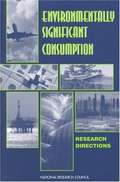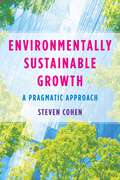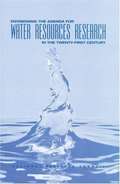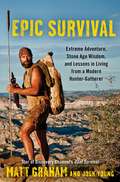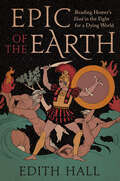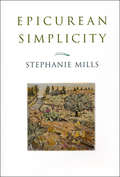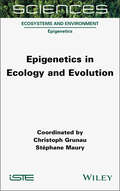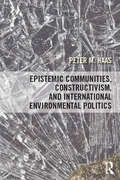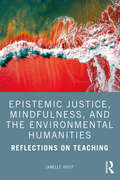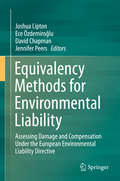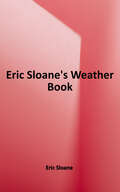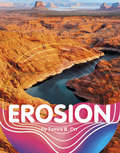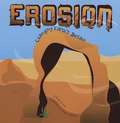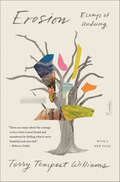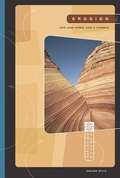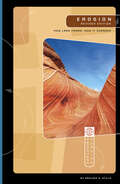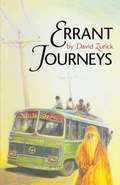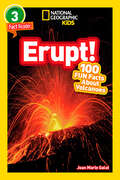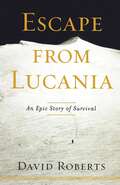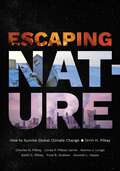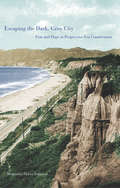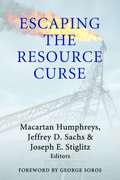- Table View
- List View
Environmentally Significant Consumption: Research Directions
by Committee on the Human Dimensions of Global ChangeThere has been much polemic about affluence, consumption, and the global environment. For some observers, "consumption" is at the root of global environmental threats: wealthy individuals and societies use far too much of the earth's resource base and should scale back their appetites to preserve the environment for future generations and allow a decent life for the rest of the world. Other observers see affluence as the way to escape environmental threats: economic development increases public pressure for environmental protection and makes capital available for environmentally benign technologies. The arguments are fed by conflicting beliefs, values, hopes, and fears--but surprisingly little scientific analysis.This book demonstrates that the relationship of consumption to the environment needs careful analysis by environmental and social scientists and conveys some of the excitement of treating the issue scientifically. It poses the key empirical questions: Which kinds of consumption are environmentally significant? Which actors are responsible for that consumption? What forces cause or explain environmentally significant consumption? How can it be changed? The book presents studies that open up important issues for empirical study: Are there any signs of saturation in the demand for travel in wealthy countries? What is the relationship between environmental consumption and human well-being? To what extent do people in developing countries emulate American consumption styles? The book also suggests broad strategies that scientists and research sponsors can use to better inform future debates about the environment, development, and consumption.
Environmentally Sustainable Growth: A Pragmatic Approach
by Steven CohenHow do we move away from the current environmentally destructive economic system toward one that is more sustainable while still ensuring continued economic growth? This book offers a positive vision of an environmentally sustainable future and lays out the steps ahead as we make the transition.Steven Cohen explores the causes of environmental degradation and examines what sustainability looks like in practice. He outlines realistic paths toward a renewable resource–based economy, demonstrating that, in many respects, the shift to sustainability is already underway. Cohen describes a range of public policy and infrastructure initiatives that can encourage cleaner production in the private sector and consumption in everyday life. He argues that the politics, advocacy, and communication around environmental protection must change to emphasize successes, reduce scare tactics, and make sure that the lifestyles and careers associated with a more sustainable world sound attractive to a wide range of people. The book depicts an appealing and equitable future that assures quality of life while protecting the planet.Environmentally Sustainable Growth brings together insights from many disciplines, spanning the latest scholarship and practical experience. Useful for students and courses, this book will be informative for practitioners, managers, analysts, activists, and scholars whose work incorporates environmental sustainability.
Environments
by Lawrence Hall of Science University of California at BerkeleyNIMAC-sourced textbook
Environments and Survival: Snails, Robots, and Biomimicry
by The Lawrence Hall of ScienceNIMAC-sourced textbook
Envisioning The Agenda For Water Resources Research In The Twenty-first Century
by National Research CouncilInformation on Envisioning The Agenda For Water Resources Research In The Twenty-first Century
Epic Survival: Extreme Adventure, Stone Age Wisdom, and Lessons in Living From a Modern Hunter-Gatherer
by Josh Young Matt GrahamMatt Graham, star of the Discovery Channel&’s Dual Survival and Dude, You&’re Screwed, details the physical, mental, and emotional joys and harrowing struggles of his life as a modern-day hunter-gatherer.Early on in his life, Matt craved a return to nature. When he became an adult, he set aside his comfortable urban life and lived entirely off the land to learn from the smallest and grandest of all things. In this riveting narrative that brings together epic adventure and spiritual quest, he shows us what extraordinary things the human body is capable of when pushed to its limits. In Epic Survival, written with Josh Young, coauthor of five New York Times bestsellers, Matt relays captivating stories from his life to show just how terrifying—and gratifying—living off the grid can be. He learns the secrets of the Tarahumara Indians that helped him run the 1,600-mile Pacific Crest Trail in just fifty-eight days and endure temperature swings of 100 degrees. He takes us with him as he treks into the wilderness to live alone for half a year, armed with nothing but a loincloth, a pair of sandals, a stone knife, and chia seeds. He recounts near-death experiences of hiking alone through the snowdrifts at the bottom of the Grand Canyon, and tells us about the time he entered a three-day Arabian horse race on foot—and finished third. Above all, Epic Survival is a book about growing closer to the land that nurtures us. No matter how far our modern society takes us from the wilderness, the call remains. Whether you’re an armchair survivalist or have taken the plunge yourself, Matt’s story is both inspiration and invigoration, teaching even the most urbane among us important and breathtaking lessons.
Epic of the Earth: Reading Homer's "Iliad" in the Fight for a Dying World
by Edith HallAn urgent study of Homer&’s Iliad, exposing the beginnings of the ecological disaster we now face and facilitating our understanding of its history The roots of today&’s environmental catastrophe run deep into humanity&’s past. Through this unprecedented reading of Homer&’s Iliad, the award-winning classicist Edith Hall examines how this foundational text both documents the environmental practices of the ancient Greeks and betrays an awareness of the dangers posed by the destruction of the natural landscape. Underlying Homer&’s account of brutal military operations, alliances, and cataclysmic struggle is a palpable understanding that the direction in which humanity was headed could create a world that was uninhabitable. Hall provides unparalleled insight into the ancient origins of climate change and argues that the Iliad exposes the deepest contradictions behind the environmental problems we have created. Indeed, it is possible that some of the violence done to the environment throughout history has been authorized, if not exacerbated, by the celebration of the exploitation of nature in Homer&’s poem. Drawing compelling analogies to contemporary poetry, literature, and film, Hall demonstrates that the Iliad, as a priceless document of the mindset of early humans, can help us understand the long history of ecological degradation and inspire activism to rescue our planet from disaster.
Epicurean Simplicity
by Stephanie Mills"In this book, I relate the pleasures, as well as the virtues and difficulties of a perhaps simpler than average North American life." So begins ecological thinker and writer Stephanie Mills's Epicurean Simplicity, a thoughtful paean to living, like Thoreau, a deliberate life.Mills's account of the simple life reaches deep into classical sources of pleasure -- good food, good health, good friends, and particularly the endless delights of the natural world. Her musings about the life she desires -- and the life she has created -- ultimately led her to the third century Greek philosopher Epicurus, whose philosophy was premised on the trustworthiness of the senses, a philosophy that Mills wholeheartedly embraces. While later centuries have come to associate Epicurus's name with hedonism, Mills discovered that he extolled simplicity and prudence as the surest means to pleasure, and his thinking offers an important philosophical touchstone for the book. An overarching theme is the destructiveness of consumerism, and how even a simple life affects a wide range of organisms and adds strain to the earth's systems. The author uses her own experience as an entry point to the discussion with a self-effacing humor and lyrical prose that bring big topics to a personal level.Epicurean Simplicity is beautifully crafted, fluid, inspiring, and enlightening, examining topics of critical importance that affect us all. It celebrates the pleasures, beauty, and fulfillment of a simple life, a goal being sought by Americans from all walks of life, from harried single parents to corporate CEOs. For fans of natural history or personal narrative, for those concerned about social justice and the environment, and for those who have come to know and love Stephanie Mills through her speaking and writing, Epicurean Simplicity is a rare treasure.
Epigenetics in Ecology and Evolution (ISTE Invoiced)
by Christoph Grunau Stéphane MauryGenetics and its mysterious little sister, epigenetics, have deep roots in the history of biology. Today, epigenetics is of paramount importance in not only the fundamental sciences, but also in life science applications, ranging from molecular biology, and disease diagnosis and treatment, to agriculture. Epigenetics in Ecology and Evolution traces the history of the concept of epigenetics in biology and describes the molecular mechanisms concerned. It examines the contributions that the emerging discipline of epigenetics has made to the fields of ecology and evolution, regarding both plant and animal organisms, as well as its place in our society. By exploring the importance of epigenetics at varying levels, from the cell to the organism as a whole, and even to the ecosystem, this book offers answers that are accessible to a wide audience, from scientifically curious citizens to students and professionals working in the world of biology. The aim is to enable everyone to acquire or develop a critical and informed perspective on the complex relationships between genetics and epigenetics.
Epistemic Communities, Constructivism, and International Environmental Politics
by Peter M. HaasEpistemic Communities, Constructivism and International Environmental Politics brings together 25 years of publications by Peter M. Haas. The book examines how the world has changed significantly over the last 100 years, discusses the need for new, constructivist scholarship to understand the dynamics of world politics, and highlights the role played by transnational networks of professional experts in global governance. Combining an intellectual history of epistemic communities with theoretical arguments and empirical studies of global environmental conferences, as well as international organizations and comparative studies of international environmental regimes, this book presents a broad picture of social learning on the global scale. In addition to detailing the changes in the international system since the Industrial Revolution, Haas discusses the technical nature of global environmental threats. Providing a critical reading of discourses about environmental security, this book explores governance efforts to deal with global climate change, international pollution control, stratospheric ozone, and European acid rain. With a new general introduction and the addition of introductory pieces for each section, this collection offers a retrospective overview of the author’s work and is essential reading for students and scholars of environmental politics, international relations and global politics.
Epistemic Justice, Mindfulness, and the Environmental Humanities: Reflections on Teaching
by Janelle AdsitEpistemic Justice, Mindfulness, and the Environmental Humanities explores how contemplative pedagogies and mindfulness can be used in the classroom to address epistemic and environmental injustice. In recent years, there has been a groundswell of interest in contemplative pedagogies in higher education, with increasing attention from the environmental sciences, environmental humanities, and sustainability studies. Teachers and writers have demonstrated how mindfulness practices can be a key to anti-oppression and anti-racist efforts, both in and out of the classroom. Not all forms of contemplative pedagogy are suited for this anti-colonial and anti-oppressive resistance, however. Simply adopting mindfulness practices in the classroom is not enough to dislodge and dismantle white supremacy in higher education. Epistemic Justice, Mindfulness, and the Environmental Humanities advocates for mindfulness practices that affirm multiple epistemologies and cultural traditions. Written for educators in the environmental humanities and other related disciplines, the chapters interrogate the western uptake of mindfulness practices and suggest anti-colonial and anti-oppressive methods for bringing mindfulness into the classroom. The chapters also discuss what mindfulness practices have to offer to the pursuit of a culturally relevant pedagogy. This highly applied and practical text will be an insightful read for educators in the environmental humanities and across the liberal arts disciplines.
Equivalency Methods for Environmental Liability
by Joshua Lipton Ece Özdemiroğlu David Chapman Jennifer PeersThe book is the only technical volume that explains how equivalency analysis methods mentioned in Annex II of the European Environmental Liability Directive should be implemented. It uses case studies to illustrate real-world application of the methods, which are based on the experience in the USA and in the European Union and have been tested in three years of training programs funded by the European Commission. Academically rigorous and technically comprehensive, the book is intended for technical experts wanting to assess damage and remediation options as well as for decision-makers wishing to commission such assessments and judge their quality. These include competent authorities, operators, financial security providers, academics, consultants and NGOs.
Eric Sloane's Weather Book
by Eric SloaneThe author instructs readers how to glean climate information by "reading" such natural phenomena as winds, skies, and animal sounds. A beautifully illustrated and practical treasure trove of enlightening lore for outdoorsmen, farmers, sailors, and anyone who has ever wondered whether to take an umbrella when leaving the house.
Erosion (Earth Materials and Systems)
by Tamra B. OrrErosion changes Earth's natural features. It breaks down materials and can help make something new. Discover why erosion is an important part of nature!
Erosion: Changing Earth's Surface
by Robin Koontz Matthew HarradDid you know that rain, waves, wind, snow, and ice can change the shape of Earth's surface? They can create valleys, sea stacks, caves, and rock arches. Learn about the natural forces of erosion and how they shape the land.
Erosion: Essays of Undoing
by Terry Tempest WilliamsTimely and unsettling essays from an important and beloved writer and conservationist In Erosion, Terry Tempest Williams's fierce, spirited, and magnificent essays are a howl in the desert. She sizes up the continuing assaults on America's public lands and the erosion of our commitment to the open space of democracy. She asks: "How do we find the strength to not look away from all that is breaking our hearts?"We know the elements of erosion: wind, water, and time. They have shaped the spectacular physical landscape of our nation. Here, Williams bravely and brilliantly explores the many forms of erosion we face: of democracy, science, compassion, and trust. She examines the dire cultural and environmental implications of the gutting of Bear Ears National Monument—sacred lands to Native Peoples of the American Southwest; of the undermining of the Endangered Species Act; of the relentless press by the fossil fuel industry that has led to a panorama in which "oil rigs light up the horizon." And she testifies that the climate crisis is not an abstraction, offering as evidence the drought outside her door and, at times, within herself.These essays are Williams's call to action, blazing a way forward through difficult and dispiriting times. We will find new territory—emotional, geographical, communal. The erosion of desert lands exposes the truth of change. What has been weathered, worn, and whittled away is as powerful as what remains. Our undoing is also our becoming.Erosion is a book for this moment, political and spiritual at once, written by one of our greatest naturalists, essayists, and defenders of the environment. She reminds us that beauty is its own form of resistance, and that water can crack stone.
Erosion: How Land Forms, How It Changes
by Darlene R. StilleErosion is constantly changing, creating, and erasing features on Earth's surface. The issue of erosion is complex. By learning more about it, we understand when and how to prevent erosion and when to let this powerful force of nature do its work alone.
Erosion: How Land Forms, How It Changes (Exploring Science: Earth Science Ser.)
by Darlene R. StilleErrant Journeys: Adventure Travel in a Modern Age
by David ZurickIn this pathfinding book, David Zurick explores the fastest-growing segment of the travel industry--adventure travel. He raises important questions about what constitutes the travel experience and shows how the modern adventure industry has commercialized the very notion of adventure by packaging it as tours.
Erupt! (Readers)
by Joan Marie GalatKids will burst with excitement as they learn all about the science and wonder of volcanoes in this new National Geographic Kids Reader. The Level 3 text provides accessible, yet wide-ranging information for fluent readers. Plus, the book includes 100 fun facts for quick and quirky information on all kinds of volcanoes, all around the world--and even some that are out of this world! The Facts Readers series bridges the gap between short, digestible knowledge nuggets and informative sustained reading.
Escape from Lucania: An Epic Story of Survival
by David RobertsIn 1937, Mount Lucania was the highest unclimbed peak in North America. Located deep within the Saint Elias mountain range, which straddles the border of Alaska and the Yukon, and surrounded by glacial peaks, Lucania was all but inaccessible. The leader of one failed expedition deemed it "impregnable." But in that year, a pair of daring young climbers would attempt a first ascent, not knowing that their quest would turn into a perilous struggle for survival. Escape from Lucania is their remarkable story.Classmates and fellow members of the Harvard Mountaineering Club, Brad Washburn and Bob Bates were two talented young men -- handsome, intelligent, and filled with a zest for exploring. Both were ambitious climbers, part of a small group whose first ascents in the great mountain ranges during the 1930s and 1940s changed the face of American mountaineering. Setting their sights on summitting Lucania in the summer of 1937, Washburn and Bates put together a team of four climbers for the expedition. But when Bates and Washburn flew to the Walsh Glacier at the foot of Lucania, they discovered that freakish weather conditions had turned the ice to slush. Their pilot was barely able to take off again alone, and there was no question of returning with the other two climbers or more supplies. Washburn and Bates found themselves marooned on the glacier, more than a hundred miles from help, in forbidding and desolate territory. Eschewing a trek out to the nearest mining town -- eighty miles away by air -- they decided to press ahead with their expedition. Escape from Lucania recounts Washburn and Bates's determined drive toward Lucania's 17,150-foot summit under constant threat of avalanches, blinding snowstorms, and hidden crevasses. Against awesome odds they became the first to set foot on Lucania's peak, not realizing that their greatest challenge still lay beyond. Nearly a month after being stranded on the glacier and with their supplies running dangerously low, they would have to navigate their way out through uncharted Yukon territory, racing against time as the summer warmth caused rivers to swell and flood to unfordable depths. But even as their situation grew more and more desperate, they refused to give up. Escape from Lucania tells this amazing story in thrilling and vivid detail, from the climbers' exultation at reaching the summit to their darkest moments confronting seemingly insurmountable obstacles. It is a tale of awesome adventure and harrowing danger. But above all it is the story of two men of extraordinary spirit, inspiring comradeship, and great courage. Today Washburn and Bates, now in their nineties, are legends in climbing circles. Bates co-led 1938 and 1953 expeditions to K2, the world's second-highest mountain. Washburn, whose record of Alaskan first ascents is unmatched, became founding director of Boston's Museum of Science and is one of the premier mountain photographers in the world. Some of his remarkable images from the 1937 Lucania expedition are included in this book.
Escaping Nature: How to Survive Global Climate Change
by Orrin H. Pilkey Keith C. Pilkey Norma J. Longo Hannah L. Hayes Charles O. Pilkey Linda P. Pilkey-Jarvis Fred B. DodsonIndustrial and agricultural greenhouse gas emissions are rapidly warming Earth’s climate, unleashing rising seas, ocean acidification, melting permafrost, powerful storms, wildfires, floods, deadly heat waves, droughts, tsunamis, food shortages, and armed conflict over shrinking water supplies while reducing nutritional levels in crops. Billions of people will become climate refugees. Hotter temperatures will allow tropical diseases to spread into temperate regions. Higher levels of CO2, allergens, dust, and other particulate matter will impair our physical and mental health and even reduce our cognitive abilities. Climate change disproportionately affects the world’s poor. It also harms Nature, and could ultimately trigger a sixth mass extinction. In Escaping Nature, Orrin H. Pilkey and his coauthors offer concrete suggestions for how to respond to the threats posed by global climate change. They argue that while we wait for the world’s governments to get serious about mitigating climate change we can adapt to a hotter world through technological innovations, behavioral changes, nature-based solutions, political changes, and education.
Escaping the Dark, Gray City: Fear and Hope in Progressive-Era Conservation
by Benjamin Heber JohnsonA compelling and long-overdue exploration of the Progressive-era conservation movement, and its lasting effects on American culture, politics, and contemporary environmentalism The turn of the twentieth century caught America at a crossroads, shaking the dust from a bygone era and hurtling toward the promises of modernity. Factories, railroads, banks, and oil fields—all reshaped the American landscape and people. In the gulf between growing wealth and the ills of an urbanizing nation, the spirit of Progressivism emerged. Promising a return to democracy and a check on concentrated wealth, Progressives confronted this changing relationship to the environment—not only in the countryside but also in dense industrial cities and leafy suburbs. Drawing on extensive work in urban history and Progressive politics, Benjamin Heber Johnson weaves together environmental history, material culture, and politics to reveal the successes and failures of the conservation movement and its lasting legacy. By following the efforts of a broad range of people and groups—women’s clubs, labor advocates, architects, and politicians—Johnson shows how conservation embodied the ideals of Progressivism, ultimately becoming one of its most important legacies.
Escaping the Resource Curse (Initiative for Policy Dialogue at Columbia: Challenges in Development and Globalization)
by Jeffrey D. Sachs Joseph E. Stiglitz Eds. Humphreys MacartanThe wealth derived from natural resources can have a tremendous impact on the economics and politics of producing countries. In the last quarter century, we have seen the surprising and sobering consequences of this wealth, producing what is now known as the "resource curse." Countries with large endowments of natural resources, such as oil and gas, often do worse than their poorer neighbors. Their resource wealth frequently leads to lower growth rates, greater volatility, more corruption, and, in extreme cases, devastating civil wars. In this volume, leading economists, lawyers, and political scientists address the fundamental channels generated by this wealth and examine the major decisions a country must make when faced with an abundance of a natural resource. They identify such problems as asymmetric bargaining power, limited access to information, the failure to engage in long-term planning, weak institutional structures, and missing mechanisms of accountability. They also provide a series of solutions, including recommendations for contracting with oil companies and allocating revenue; guidelines for negotiators; models for optimal auctions; and strategies to strengthen state-society linkages and public accountability. The contributors show that solutions to the resource curse do exist; yet, institutional innovations are necessary to align the incentives of key domestic and international actors, and this requires fundamental political changes and much greater levels of transparency than currently exist. It is becoming increasingly clear that past policies have not provided the benefits they promised. Escaping the Resource Curse lays out a path for radically improving the management of the world's natural resources.
Esculturas de la naturaleza (¡Arriba la Lectura!, Level M #25)
by Margaret FettyQuizá no lo sabías, pero el viento, el agua y el hielo transforman el suelo. Estas fuerzas actúan por millones de años y crean esculturas en la naturaleza. Descubre cómo lo hicieron y qué formas asombrosas crearon. NIMAC-sourced textbook
